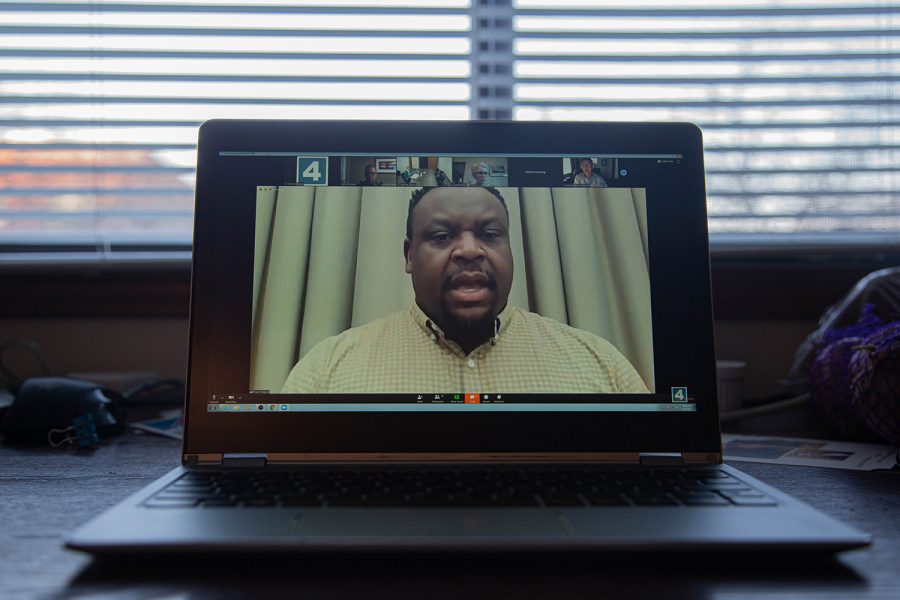Police to increase cultural competency training, dialogue with community
The Iowa City Police Department condemns the death of George Floyd and pledges to protect the rights and voices of community members.
Mayor Bruce Teague speaks at a city council meeting over Zoom on Tuesday, April 7, 2020. Items included the possible building of solar panels in Waterworks Prairie Park and the COVID-19 City Employee Pay Plan.
June 3, 2020
The Iowa City Police Department will increase cultural competency for officers and engage Iowa City residents in dialogue, pledging to support the voices of community members, as protests for the Black Lives Matter movement continue throughout the country.
At Tuesday’s Iowa City City Council meeting, Mayor Bruce Teague condemned Minneapolis police officer Derek Chauvin, who killed George Floyd, a 46-year old black man, after kneeling on his neck for at least eight minutes.
Teague said that he holds the three officers who stood by and did nothing as complicit in Floyd’s death as well.
“We hopelessly watched a black man’s life fade before our very own eyes,” Teague said. “It is 2020, and [Floyd’s] death marks yet another incident of violence towards a black man, reminding us that we are still fully engaged in our battle to end racism.”
Iowa City Interim Police Chief Bill Campbell spoke at the meeting and said the department would continue ongoing training to instruct officers in working with differences among officers and citizens. Educational opportunities include cracking the code of social justice; engaging with LGBTQ+ communities; advancing racial equity, unconscious bias, and implicit bias; and engaging with immigrant and refugee communities.
However, Campbell said he acknowledges the police department is not a perfect organization, and that the department will strengthen the group of field supervisors that supervise officers when they are out on the job.
“We understand the importance of holding our officers accountable for their actions,” Campbell said. “Our frontline supervisors are key to the success in the field. We also need our community to help us determine and to let us see what our strengths and weaknesses are.”
In a press release on Tuesday, the city announced it would hold three public events entitled “Speak Up, Speak Out” to give community members the opportunity to have their voices heard, as previously reported by The Daily Iowan.
Campbell added that the police department has a long history working with the Iowa City Police Citizens Review Board in reviewing policy and handling with compliance. Recently, he said, the department collaborated with the NAACP to address issues before they become problems.
“These organizations and others are vital to the health of the department,” Campbell said, “…and vital to the health of the community that we are able to provide the transparency that the community is looking for. We are a good organization, but we can be better.”
Teague said the department would continue to focus on training officers in cultural competency, eliminating racial bias, and extensive de-escalation training to prevent incidents from rising into physical violence.
Many of the city councilors expressed their feelings of solidarity with the Black Lives Matter protests. City Councilor Janice Weiner said seeing demonstrations around the country in protest of Floyd’s and many others’ deaths reminded her of how the Germans protested many nights for change, leading to the fall of the Berlin Wall.
“None of that could have happened if they did not have the courage to tell their communities and the government what they needed and what they felt,” Weiner said. “In solidarity with those that need to have their voices and their anguish heard, we stand.”
Iowa City Police Union President Andrew Rich said the union does not condone violence and improper police practices, and that the actions of the officers in Minneapolis go completely against their beliefs.
“We will not defend acts of brutality in our community,” Rich said. “We will not be complicit in an act of police brutality by one of our own members, or members from another department. We want to thank the protestors that poured their hearts out peacefully, and we want you to know: we do support you, and we support the cause.”



